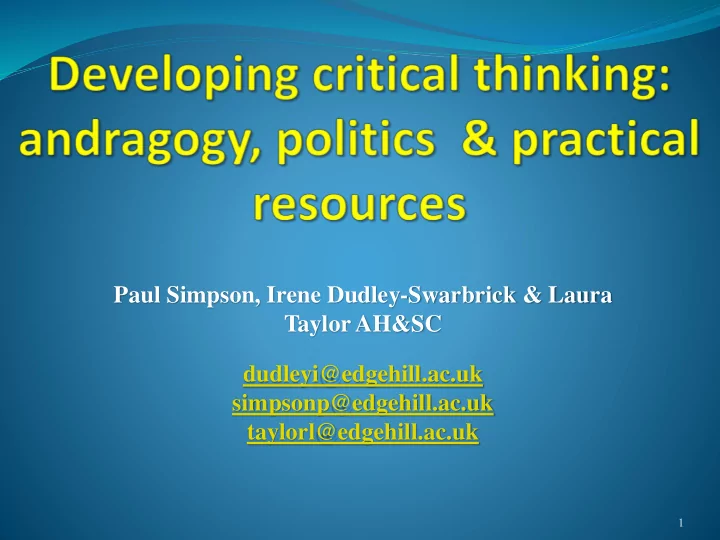

Paul Simpson, Irene Dudley-Swarbrick & Laura Taylor AH&SC dudleyi@edgehill.ac.uk simpsonp@edgehill.ac.uk taylorl@edgehill.ac.uk 1
Agenda Andragogy: philosophy 1. Defining & identifying analytical skills, a checklist at 2. level 4. 3. Encouraging analytical skills – practicalities at level 5 plus: a) Being analytical – an interactive resource b) Modes of organizing c) Analytical writing. 2
Current practice Jot down what you do to promote critical thinking by yourself, among any students & colleagues. Share with your neighbour /s. Any patterns? Share with whole group. 3
Andragogy – philosophy of learning Feminism - learner’s positioning inherently political, yet unequal relations covert and pre-reflective. (Barad, 2012; Freire, 1984; Haraway, 1988). Location shapes us and a resource. Socialist humanism - Freire (1970; 1993; 2005) ‘pedagogy of the oppressed’ and ‘conscientization’: ‘… the oppressed must be their own example in the struggle for their redemption’ (Freire, 1970: 54). [ Critical theories ( egalitarian, humanist & pragmatist) – encourage critique as (developing) habit that entertains ‘alternatives to orthodoxies’ & are critical of themselves (Brookfield: 1997; 2005). 4
Criticality: level 4 www.eshare.edgehill.ac.uk/6588 5
Analytical skills – checklist, L4 Explained theories/concepts with concrete examples, accessible to intelligent person NOT tutor. Kept explanation brief - precursor to evaluation. Read between the lines or behind appearances? Unpacked assumptions behind theory – how fits with learners’ observed experience? Noted anything missing that the theory should reasonably address or has addressed inadequately? Fit with observed experiences - any ‘screaming silences’ (Serrant-Green 2004; 2010). Yours/others experiences absent/erased/silenced? Explained pros &cons of theories? Used as debating tools & assessed which theory, on balance, has most explanatory value & why? Encourages taking a stand. Nuanced your evaluation? Identified what parts of a theory hold up & in what contexts. Which parts of a theory can you accept, reject or even modify? Check: have you presented a logically unfurling story that elaborates a position/comes to a conclusion? 6
Practical tips 1) Do you discourage linear note-taking & encourage a format that builds in analysis? 2) Do you set assignments that oblige analysis? 3) Thought about playing DARTS ( Directed Activities Related to Texts) - exercises that require reading for meaning – give two short examples of descriptive and analytical prose in class and get students to assess merits. Timed just before assessment. 4) Do you use tales of the unexpected – counter- intuitive, controversy &, in context, use of provocative stereotypes. 7
Being analytical – level 5+ http://www.eshare.edgehill.ac.uk/6872/ Interactive resource – 4 questions, a checklist & an article that encourages looking beyond commonsense. 8
Is it working? Analytics On e-share – universally available. Available via BB to 7 programmes and at least 1,000 students. 340 hits and 240 downloads (69%). Effects? Meeting a need and just before assessment? Under review. 9
Organizing for analysis 10
Writing analytical 11
Over to you... applications Thank you for listening – welcome your thoughts & questions. Application to your area? Suggestions for improvement? dudleyi@edgehill.ac.uk simpsonp@edgehill.ac.uk taylorl@edgehill.ac.uk 12
Take-home messages Value of critical theories/andragogies that involve politics, cognition & learning through emotions and premised on engagement. These view student experiences as a resource & start-point for development of habitual, critical attitude. Shared resources - interactive and aimed at analytical writing – adaptable to level & require ongoing evaluation and improvements in light of student feedback and tutor judgement. Analytics suggest that learners see some value in our resources especially just before assessment period – good timing essential. 13
Recommend
More recommend